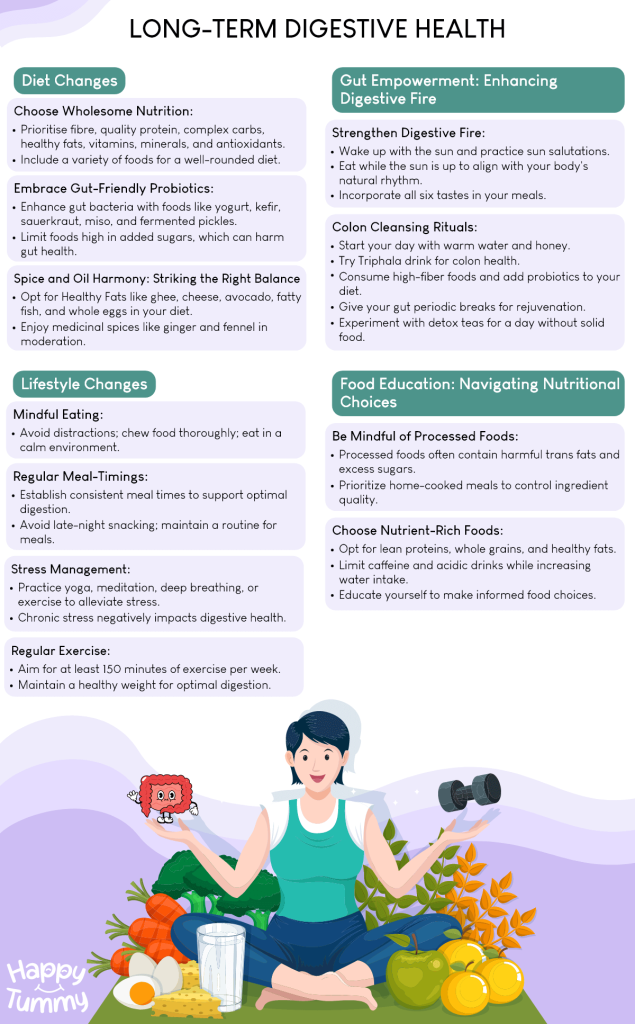Table of Contents
The Indian tradition has venerated digestive health since ancient times. The turmeric and other spices, the time of eating, the quantity, and the tattvas, all these things confluence together to make a joyful living.
However, the busy modern lifestyle has stormed and dusted down our very digestive health. This has impacted not just our present but our future as well.
To age gracefully, you must have better digestive health. It’s a must. And to have better digestive health, you must start working on it now.
Here are some scientifically proven tips to enhance your long-term digestive health.
Having an excellent long-term digestive health depends on a few factors:
- The diet
- The lifestyle
- Immunity
Let’s start our journey.
Take Care of Your Diet
What we eat is what we become. This is why eating super spicy foods has been linked to high levels of anger. To have a better life, you have to make better food choices. [1]
1. Have a wholesome, nutritious meal
When we say wholesome, we mean meals that contain lots of
- Fibre
- Good quality protein
- Complex carbs
- Healthy fat (HDL – unsaturated fats such as cold-pressed oils, nuts, seeds, etc.)
- Vitamins, minerals, and antioxidants
- Probiotics
These nutrients can easily be gained from eating lots of vegetables, fruits, whole grains, nuts, seeds, seafood, etc.
Try to have a diverse diet containing small portions of each of these. You should not depend on one food alone. People living in blue zones (zones where people live longest) tend to have a diverse diet containing around 18 different types of fruits and vegetables each day. [2]
2. Befriend the gut bacteria
Our guts are home to a large (in trillions) population of healthy gut bacteria that help us digest our food. The higher their number, the better their population. These bacteria can be enhanced using foods rich in probiotics.
Here are some: yoghurt, curd, kefir, sauerkraut, fermented foods such as idli batter, dhokla batter, etc., kimchi, miso, traditional buttermilk, fermented pickles, etc.
Foods with added sugar are a big no.
The recommended daily intake of sugar is around 24g for women and 36g for men[3]
We eat 4-5 times higher this amount these days. Always check labels for added sugars.
3. Say No to Super Spicy and Oily Meals
Spices surely add kick and flavours to your meal, but they take away the flavours from your life when you consume beyond limits. Spices were discovered and introduced into Indian cuisine by Ayurveda for their benefits.
For example, Cinnamon helps with digestion, but too much of it causes diarrhoea, heartburn, burping, etc. However, they must be consumed within healthy limits. Consume medicinal spices only when needed.
Food high in spices can easily irritate your digestive tract and create indigestion. This can induce diarrhoea, IBS, and ulcers if not reduced in time. [4]
The same goes for oil and other fat. Avoid trans-fat, limit saturated fat, and consume healthy fat. If you are a fan of deep-fried and processed food, don’t be from now on. Keep those pakoras for rainy days only. And if you live in areas with high rainfall, keep them for once a fortnight only.
What you must include in your diet are healthy fats like ghee, cheese, avocado, fatty fish, whole eggs, etc. Also, include ginger, carom seeds and fennel seeds for naturally improving your digestion.
It is necessary to have a well-hydrated body to have smooth digestion. Just ensure that you do not drink it in between your meals

Take Care of Your Lifestyle
Once you’ve made the right food choices, it comes down to finely tuning your lifestyle. It is because a poor lifestyle can easily spill over your dietary efforts. Here is what you need to do regarding lifestyle to have better longer-term digestive health:
1. Eat Mindfully
Most of us are used to eating while watching our favourite shows. But this stops our digestive system from working at its full potential. We don’t salivate much, our hunger and satisfaction signals become delayed, and we over-eat. Overeating is never a good thing when it comes to health.
- Eat in peace
- Chew your food thoroughly
Also read – Benefits of Mindful eating
2. Have Regular Meal-timings
Firstly, if you have a habit of late-night munching, change it. Secondly, eat your meals on time around the same time each day. Lastly, never skip your breakfast, have a wholesome meal (just don’t overeat), and have a light dinner. The lunch should be done at around 1 pm and dinner at least 3-4 hours before your bedtime.
Also read – Meal timing for digestive ease and weight loss
3. Manage Stress
Stress impacts not just your digestion but your overall well-being. It can easily reduce your lifespan. It can easily be managed through practices such as yoga, meditation, deep breathing, exercise, etc. [5]
Also: Stress management techniques for weight loss
4. Exercise Regularly
Try aiming for at least 150 minutes of exercise per week. This can be done by breaking it into 30 minutes of exercise 5 days a week. The benefits? Numerous. From better heart health to increased immunity, uplifted mood, enhanced immunity, and of course, wonderful digestion.
Maintain a healthy weight. Remember, good digestion is good weight management and vice versa
Take care of your gut
For long-term digestive health, taking care of your gut and its functioning becomes very important. These tips will help improve your gut functioning and will aid your long-term digestive health.
1. Empowering Your Digestive Fire
Digestive fire can be thought of as the driving force for our body’s ability to digest food and absorb nutrients. It strengthens our metabolism and digestion by improving the secretion of digestive enzymes, stomach acid and bile in the GI tract.
To empower your body’s digestive fire you can:
- Wake up with the sun and practise sun salutations to strengthen your digestive fire
- Eat while the sun is up as our digestive fire is the strongest during the day time.
- Incorporate all the six taste in your food: sweet, salty, sour, bitter, pungent, and astringent
- Use spices and herbs
- Take light meals at frequent intervals
2. Start your day with Colon Cleansing
The colon or the large intestine is an important organ of our digestive system and to keep it healthy you can practise colon cleansing using natural methods. Cleansing ensures that you remove the toxins from your body which enables better functioning of cells. You can do it by:
- Start your day with warm water infused with honey.
- Start your day with Triphala drink (amla, vibhitaka, haritiki)
- Eating high-fibre food like salad
- Adding probiotics to your food
3. Giving rest to your gut
A reset or a break is important for our mood and brain. It rejuvenates it, refreshes and replenishes it. Similarly, it is important for our digestive system as well. Give your gut rest by fasting or by sipping on detox teas for a day without eating food. This helps improve your metabolic functions, improve your liver function, and make you feel lighter.
You can try sipping:
- Gourd juice, and amla juice for detox
- Fennel, ginger, cinnamon, hibiscus infused tea
- Oolong tea, matcha tea or green tea
Take Care of Food Education
The market is stuffed with food items these days. This load can easily confuse us and we may fail to guess their quality. Today, we don’t know what to eat, what the right food is, what is wrong, what might harm, and what should be eaten at specific times. If you want to have better digestion in the long term, you must know the foods you eat. Here are a few tips:
- Most processed food is always bad and is loaded with trans-fat plus sugars
- Spices should be taken within healthy limits
- Simple carbs must be replaced with complex carbs
- Bad fat (LDL) must be replaced with good fat (HDL)
- Canned juices and other beverages must be avoided due to high sugar content
- Intake of lean proteins must be increased
- Wholegrains must be taken
- Caffeine and other highly acidic drinks should be limited
And food must be cooked at home as much as possible.
End Note
Our food choices weave the threads of longevity. What we choose to eat today decides the quality of our long-term digestive health.
To get a stronger stomach for life, embrace a diet rich in nutrients, hydrate wisely, and say goodbye to excess spices and oils. Apart from diet, you must eat mindfully, harmonize your meal timings, and dance away stress through exercise and mindfulness.
Educating yourself on food is very important. Know which calories are bad and which are good. Say a big no to processed foods and hi to whole grains.
Digestive health thrives when nourished with mindful choices and time-honoured practices. So, let your life be a joyful journey rather than a painful one.
FAQs
Digestive issues can stem from various factors, including poor dietary choices, stress, lack of physical activity, medical conditions, or underlying digestive disorders. Identifying the specific cause may require consultation with a healthcare professional.
Digestive problems can manifest as symptoms such as bloating, gas, abdominal pain, constipation, diarrhea, indigestion, heartburn, and unexplained weight changes.
Persistent symptoms should be discussed with a healthcare provider for proper evaluation.
Three superfoods beneficial for gut health include:
• Additionally, you can take Triphala powder or ginger.
• Fatty fish (such as salmon) contain omega-3 fatty acids, which may have anti-inflammatory effects on the digestive tract.
• Fibre-rich foods like fruits, vegetables, and whole grains to support digestion.
• Yogurt and other probiotic-rich foods for promoting healthy gut bacteria.
The approach to addressing slow digestion depends on the underlying cause. Lifestyle changes, such as incorporating fibre-rich foods, staying hydrated, and regular exercise, can help. You can also focus on empowering your digestive fire by fasting or taking detox juices/teas, eating at regular times and eating before the sun sets. Medical interventions may be necessary in some cases, and consultation with a healthcare professional is recommended.
Irritable Bowel Syndrome (IBS) doesn’t have a permanent cure, but its symptoms can be managed. Lifestyle modifications, stress management, dietary changes (like a low-FODMAP diet), and medications a healthcare professional prescribes can help alleviate IBS symptoms.
To address gas and anxiety, consider the following:
• Adopt relaxation techniques, such as deep breathing or meditation, sipping calming teas, etc.
• Evaluate and adjust your diet to reduce gas-producing foods.
• Identify and manage triggers causing anxiety.
• Stay physically active to promote digestive health.
Certain foods can negatively impact gut health. These include:
• Excessive alcohol, as it disrupts the balance of gut bacteria.
• Foods containing artificial sweeteners affect gut flora.
• High-fat and fried foods cause digestive discomfort.
• Highly processed foods with added sugars and artificial additives.















